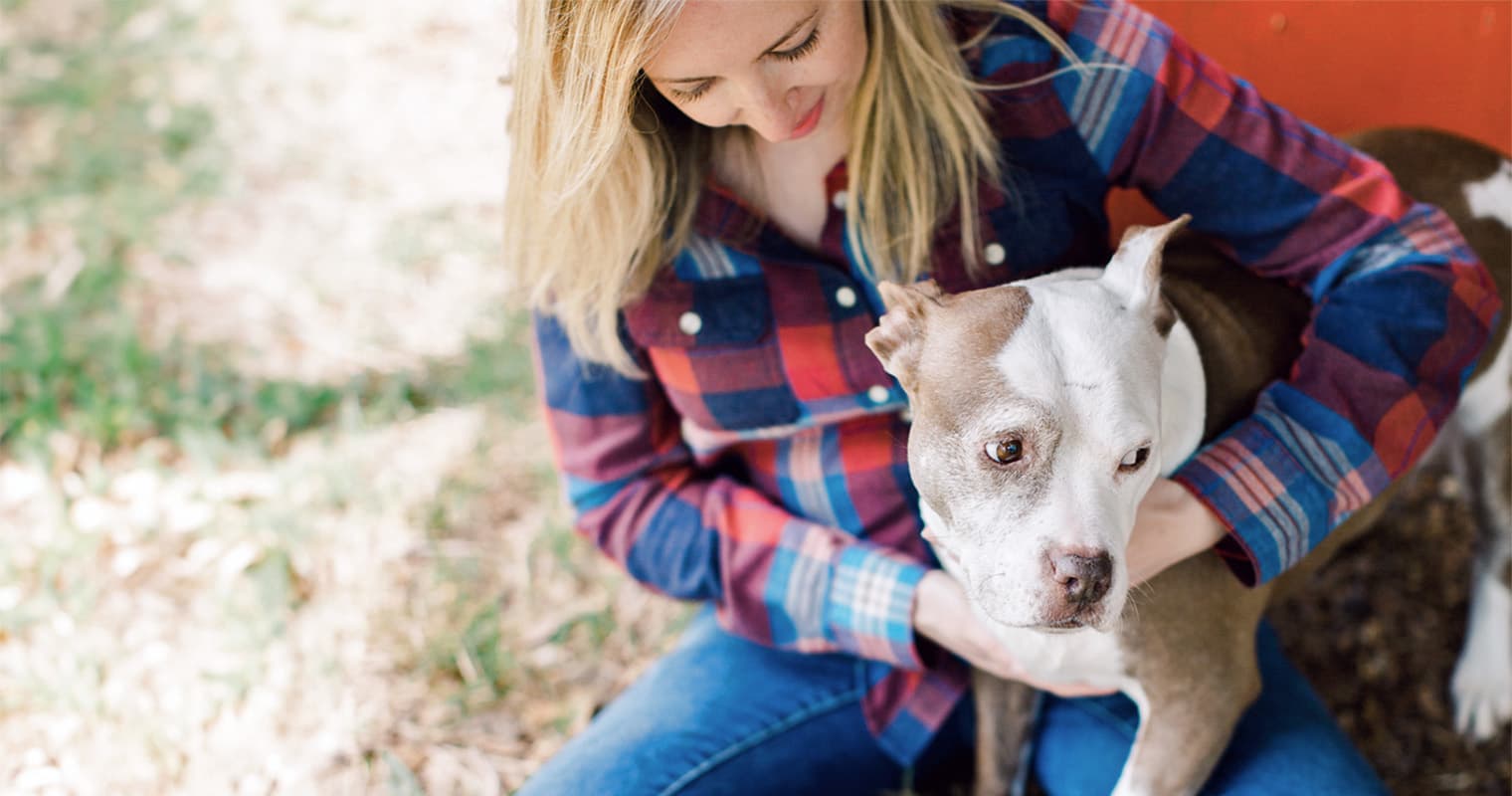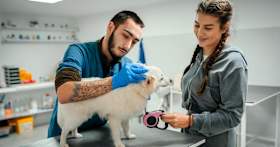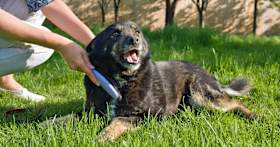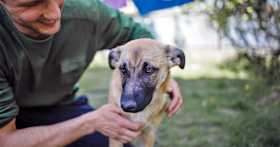What You Need to Know About Hyperthyroidism in Dogs
Hyperthyroidism isn’t a dealbreaker. Learn what it takes to care for a dog with hyperthyroidism.
Hyperthyroidism isn’t a dealbreaker. Learn what it takes to care for a dog with hyperthyroidism.
by Katie Koschalk, | September 8, 2025

Ali Harper / Stocksy
Hypothyroidism in dogs is rare — only about 1 in every 500 dogs is diagnosed with it each year. So what does it mean if your dog is one of the unlucky ones? How do you spot the signs? And if they’re diagnosed, what does treatment — and daily life — actually look like? And is this condition manageable for the average pet parent?
Dogs with hyperthyroidism will require extra care, but it can be a worthwhile choice for those prepared to meet their needs. Here’s a guide to everything you need to know about caring for a dog with hyperthyroidism, from treatment options to daily care.
Hyperthyroidism is a condition that occurs when the thyroid gland in the neck produces an excess of hormones.
“Hyperthyroidism in dogs is rare and most commonly caused by a tumor of the thyroid gland,” says Dr. Carol Osborne, author and integrative veterinarian at Chagrin Falls Pet Clinic. She adds that elderly canines, especially Golden Retrievers, Huskies, and Boxers, are most prone to hyperthyroidism.
In some cases, giving a dog with hypothyroidism (a sluggish thyroid) too much oral thyroid hormone can lead to hyperthyroidism. In these instances, Dr. Osborne explains, blood tests are used to confirm the issue, and treatment with methimazole, an oral medication, may be prescribed to reduce hormone levels.
Some research also suggests that raw meat diets, particularly those containing thyroid tissue from other animals, may contribute to elevated thyroid levels. Additionally, consuming foods or supplements that contain kelp or seaweed, which are high in iodine, can increase the risk of hyperthyroidism in dogs.
Hyperthyroidism in dogs can create a variety of symptoms, many of which may mimic other health issues. This makes it important for pet parents to bring their dogs to the vet for a thorough evaluation.
Symptoms of hyperthyroidism in dogs may include the following.
Weight loss: One of the hallmark signs of hyperthyroidism is unexplained weight loss, even when your dog is eating as much or more than usual.
Increased thirst and frequent urination: Dogs with hyperthyroidism often drink more water than normal, which can lead to more frequent urination.
Hyperactivity or restlessness: Excess thyroid hormones can make your dog more energetic than usual, leading to restlessness, pacing, or difficulty settling down.
Rapid heart rate or irregular heartbeat: Hyperthyroidism can cause the heart to beat faster or develop an abnormal rhythm, which your vet can detect during a routine exam.
Enlarged thyroid gland: In some cases, the thyroid gland may become enlarged and form a lump in the neck area, which might be visible or palpable.
Vomiting or diarrhea: An upset digestive system, including vomiting and diarrhea, can occur in dogs with hyperthyroidism, often due to the increased metabolic rate.
Changes in coat quality or excessive shedding: You may notice changes in your dog’s coat, such as thinning fur, a dry texture, or excessive shedding, which can be another sign of an overactive thyroid.

Regular vet visits are key to keeping your pet healthy. Here’s what happens during a checkup, when to get them, and what to bring.
Treatment for hyperthyroidism in dogs depends on the cause of the disease. Dr. Osborne notes that while the condition can generally be treated, it often can’t be cured. Your veterinarian will design a treatment plan based on the underlying issue and your dog’s specific condition. The following are common treatment options.
“The treatment for hyperthyroidism in dogs caused by thyroid cancer involves surgical removal of one or both cancerous thyroid glands,” Dr. Osborne says. On average, after the surgical removal of the cancerous thyroid, the dog’s lifespan can be extended by one to three high-quality years, assuming the mass is small, not attached to surrounding tissue, and hasn’t spread to the lymph nodes or blood, she explains.
If a thyroid tumor is attached to surrounding tissue, complete surgical removal may not be possible. In such cases, a surgeon can often remove a significant portion of the tumor and follow up with chemotherapy and/or radiation therapy to target any remaining tumor cells. In these cases, survival is usually under a year.
After surgery, the dog will need to take Synthroid, an oral synthetic thyroid hormone, since they will no longer be able to produce thyroid hormones naturally, Dr. Osborne adds.
If hyperthyroidism is linked to dietary factors, such as feeding a raw meat diet, switching to a different food plan may resolve the condition. Additionally, Dr. Osborne says a low-carb diet may be recommended, as it can help manage thyroid hormone levels by reducing the intake of foods that may exacerbate the condition.
If hyperthyroidism is caused by overuse of the hormone medication treating hypothyroidism, a veterinarian may adjust the dog’s medication to balance thyroid hormone levels. Regular blood work is essential to ensure hormone levels stay within a healthy range.
The time you have with your newly adopted dog will depend on the cause of their hyperthyroidism. In cases where the condition limits their lifespan to just a year or two, providing a loving home is a deeply compassionate, rewarding choice. Giving dogs comfort and care during their remaining years will make a meaningful impact.
If the hyperthyroidism is due to overmedication or diet, proper treatment can allow your dog to live a normal, full life.
Regardless of the cause, both situations require commitment and ongoing care. Here are a few tips to help you navigate life for a dog with hyperthyroidism.
If your dog is prescribed medication, like methimazole or Synthroid, it’s crucial to follow the dosing schedule exactly as directed. Set reminders, if needed, to be sure your dog receives their medication consistently. If diet is a contributing factor, work with your veterinarian to provide the best nutrition for your dog.
Keep a close eye on your dog’s behavior and overall health. Watch for signs of improvement or worsening symptoms, such as changes in appetite, energy levels, or coat condition. If you notice any changes, check in with your vet, who may need to adjust their treatment plan.

A major part of pet parenthood is financially planning for your pet’s future. Here’s a guide to get you on track.
Consistent veterinary checkups are key to monitoring your dog’s thyroid hormone levels and overall health. Your vet will likely recommend regular blood tests to determine if their treatment is working effectively, and make any necessary adjustments.
Hyperthyroidism often requires ongoing treatment and regular monitoring, which means more frequent vet visits and additional costs. Consider whether you have the time, patience, and financial resources to care for a dog with a medical condition like hyperthyroidism.
If you’re able to provide the necessary care, that’s fantastic. While it might feel overwhelming at first, establishing a routine will make managing their needs easier — and seeing the dog thrive under your care can be very fulfilling.
Adopting a senior dog is an excellent choice for those looking for calmer pets, who are more responsive to basic commands and have established personalities. Though they may require additional care for conditions like hyperthyroidism, they can still lead happy, fulfilling lives with the right support.
No, there’s no vaccine for hyperthyroidism in dogs. Vaccines generally protect against infectious diseases caused by viruses or bacteria, whereas hyperthyroidism is a hormonal disorder.
A dog with hyperthyroidism caused by a thyroid tumor may live up to three years following treatment, depending on the characteristics of the cancer. For hyperthyroidism caused by overmedication or diet, life expectancy is typically normal once the underlying issue is addressed.
Hyperthyroidism may cause hyperactivity or restlessness, but aggressive behavior is rare. Proper treatment can prevent behavioral changes and keep your dog calm and comfortable.
“Disorders of the Thyroid Gland in Dogs - Dog Owners.” Merck Veterinary Manual, www.merckvetmanual.com/dog-owners/hormonal-disorders-of-dogs/disorders-of-the-thyroid-gland-in-dogs.
“Veterinary Internal Medicine in Bannockburn, IL | Veterinary Specialty Center.” Veterinary Specialty Center, 7 Nov. 2024, www.vetspecialty.com/specialties/internal-medicine/handouts/hyperthyroidism/. Accessed 8 Sept. 2025.
Feb 29, Nandini Maharaj Published:, et al. “Hyperthyroidism in Dogs: Symptoms, Causes, and Treatments.” American Kennel Club, 29 Feb. 2024, www.akc.org/expert-advice/health/hyperthyroidism-in-dogs/.
O’Neill, D.G., Khoo, J.S.P., Brodbelt, D.C. et al. Frequency, breed predispositions and other demographic risk factors for diagnosis of hypothyroidism in dogs under primary veterinary care in the UK. Canine Med Genet 9, 11 (2022). https://doi.org/10.1186/s40575-022-00123-8

Katie Koschalk is a freelance writer based in Northern California. Fusing her love and knowledge of animals with her journalism degree and years of professional writing, Katie is dedicated to improving the lives of pets and their caretakers by sharing helpful and accurate information. When she’s not at her desk, you can find her exploring trails with her Aussie, Hunter, cooking plant-based meals, and talking to her two cats, Jax and Sadie, in really ridiculous voices.

Pet Wellness

Adoption Advice

Adoption Advice

Adoption Advice
Stray dogs often thrive in new homes, but proper preparation and patience are key to a smooth transition

Foster & Volunteer
Fostering comes with important responsibilities. Learn which shelter or rescue is right for you by asking these key questions.

Adoption Advice
Aside from keeping your dog pretty or handsome, grooming is an important part of maintaining their health. Here are some tips on knowing when your pup needs a little freshening up.

Adoption Advice
From avoiding behavior issues to preventing unwanted pups, there are several reasons why it makes a whole lot of sense.

Adoption Advice
Learn how to spot food allergies in your newly adopted dog and manage their diet with confidence.

Adoption Advice
Adopting a dog with a difficult past doesn’t have to be a deal-breaker. Here’s how you can help them thrive in their new home.